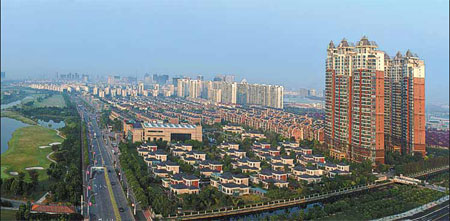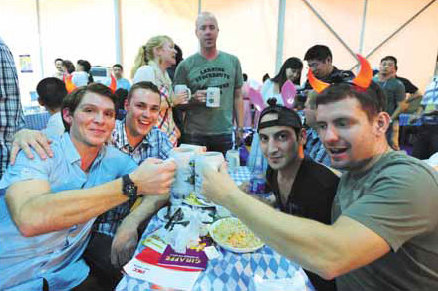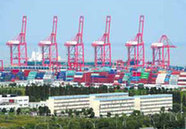Taicang emerging as modern city
Updated: 2013-04-22 07:26
By Wu Ni (China Daily)
|
||||||||
|
With a planned layout dotted with farmland, forests and canals, the city stresses ecological awareness in the process of urbanization and industrialization. Photos Provided to China Daily |
|
The Beer Festival in Taicang deepens cultural exchanges between foreigners and local residents. |
|
The city is on its way to becoming a comprehensive industrial center. |
The government of Taicang, a city in the southeastern part of Jiangsu province, has an ambitious plan to build it into a modern city that balances urbanization with protection of the natural environment.
"We want to map out the urban design from the perspective of ecological sustainability," said Lu Liusheng, municipal Party secretary of Taicang.
The plan for the general layout of Taicang is to construct a green center in the urban area as well as a port city and three small towns - Shaxi, Liuhe and Hengjing.
According to the local government, each newly developed area will have its own advanced system of modern infrastructure and facilities to meet the demands of local residents.
"Ultimately, the city will be composed of farmland, forests and canals. And those who live in the area can live in harmony with nature," Lu said.
Official statistics show the urbanization rate of Taichang is 28.5 percent, which means there is great potential to tap into its industrial and commercial resources.
Taicang has more than 400,000 mu, or 26,667 hectares, of farmland, of which 252,500 mu is considered fertile.
The average rice yield in the city has reached more than 650 kilograms per mu, with the average net income exceeding 1,000 yuan per mu.
"Farming is very lucrative if we apply mechanized farming and upgrade the technology, " Lu said.
In the future, the city will set aside a large amount of high-quality farmland and nurture talented farmers to encourage modern agriculture.
Other industries
In addition to farming, other industries play a key role in the city's continued prosperity.
The port area of Taicang Economic Development Zone has attracted a total investment of more than 100 billion yuan($15.6 billion).
It has built up three pillar industries worth more than 10 billion yuan - petrochemicals, electricity and energy, and light industrial papermaking.
Meanwhile, emerging industries, like alternative energy, new materials and new equipment, have also taken shape in the area.
Taicang is now home to 26 Fortune 500 companies and 25 State-owned enterprises.
More than 500 enterprises from Europe and the United States have also based their operations in the city.
One example is the surging number of German companies that have invested in Taicang.
The city has introduced 180 projects from Germany with a combined annual output value of roughly 30 billion yuan, making Taicang one of China's best places for foreign investment.
The local government's focus is on building a modern city that has a strong economy, a wide range of services, a pristine environment as well as a sophisticated culture and society, Lu said.
Balanced development
Despite the city's increasing economic clout, the integration of its urban and rural areas remains weak relative to peer cities throughout China.
In the near future, it will be formed into a metropolis surrounded by smaller suburbs.
"Just like the ones in Europe, the smaller cities here have facilities to meet the basic needs of life. Residents can go to the main city conveniently as well," Lu said.
Ye Haisheng, director of the Taicang Building and Public Construction Bureau, said that like many other cities, Taicang has encountered its share of problems during its industrialization process.
Those problems include air pollution and disparities between urban and rural areas in terms of incomes and public services.
"Therefore, the guideline for us with regard to urban construction is to be green and integrated," Ye said.
The city will build a rapid transit bus system to advocate low-carbon transport.
Traditional modes of development, which lead to congestion and chaos, will be avoided.
Another important goal of the blueprint is to enhance public services for rural residents so that they can enjoy the same rights as their urban counterparts, Ye said.
To achieve the goal, Taicang is encouraging rural residents, who traditionally are spread throughout small villages, to live together in communities."We will improve infrastructure for these communities to enable farmers to enjoy convenient transportation and other benefits, such as water safety, medical care, education and a cleaner environment," Ye said.
wuni@chinadaily.com.cn

 'Taken 2' grabs movie box office crown
'Taken 2' grabs movie box office crown
 Rihanna's 'Diamonds' tops UK pop chart
Rihanna's 'Diamonds' tops UK pop chart
 Fans get look at vintage Rolling Stones
Fans get look at vintage Rolling Stones
 Celebrities attend Power of Women event
Celebrities attend Power of Women event
 Ang Lee breaks 'every rule' to make unlikely new Life of Pi film
Ang Lee breaks 'every rule' to make unlikely new Life of Pi film
 Rihanna almost thrown out of nightclub
Rihanna almost thrown out of nightclub
 'Dark Knight' wins weekend box office
'Dark Knight' wins weekend box office
 'Total Recall' stars gather in Beverly Hills
'Total Recall' stars gather in Beverly Hills
Most Viewed
Editor's Picks

|

|

|

|

|

|
Today's Top News
Millionaire Cartes elected Paraguayan president
DPRK in talks with Iran for oil deals
Investment patterns alter with times
Official promotes Beijing-Washington ties
Baoxing struggles to recover after quake
Chinese soldiers clear mines, win hearts
Intl scholarship puts China on the map
More bird flu patients discharged
US Weekly

|

|










